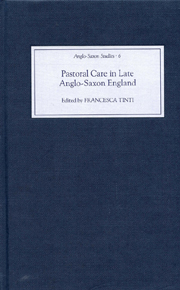Book contents
- Frontmatter
- Contents
- List of illustrations
- List of contributors
- Abbreviations
- Introduction
- 1 The clergy in English dioceses c. 900–c. 1066
- 2 The ‘costs’ of pastoral care: church dues in late Anglo-Saxon England
- 3 Ælfric in Dorset and the landscape of pastoral care
- 4 Is there any evidence for the liturgy of parish churches in late Anglo-Saxon England? The Red Book of Darley and the status of Old English
- 5 Remedies for ‘great transgressions’: penance and excommunication in late Anglo-Saxon England
- 6 The pastoral contract in late Anglo-Saxon England: priest and parishioner in Oxford, Bodleian Library, MS Laud Miscellaneous 482
- 7 Caring for the dead in late Anglo-Saxon England
- Index
6 - The pastoral contract in late Anglo-Saxon England: priest and parishioner in Oxford, Bodleian Library, MS Laud Miscellaneous 482
Published online by Cambridge University Press: 12 September 2012
- Frontmatter
- Contents
- List of illustrations
- List of contributors
- Abbreviations
- Introduction
- 1 The clergy in English dioceses c. 900–c. 1066
- 2 The ‘costs’ of pastoral care: church dues in late Anglo-Saxon England
- 3 Ælfric in Dorset and the landscape of pastoral care
- 4 Is there any evidence for the liturgy of parish churches in late Anglo-Saxon England? The Red Book of Darley and the status of Old English
- 5 Remedies for ‘great transgressions’: penance and excommunication in late Anglo-Saxon England
- 6 The pastoral contract in late Anglo-Saxon England: priest and parishioner in Oxford, Bodleian Library, MS Laud Miscellaneous 482
- 7 Caring for the dead in late Anglo-Saxon England
- Index
Summary
In the mid eleventh-century manuscript, Oxford, Bodleian Library, MS Laud Miscellaneous 482, vernacular confessional and penitential texts are juxtaposed with the ordines for the sick and dying, a unique combination in the surviving Anglo-Saxon material. Although in themselves most of these texts are conventional, their combination is not, and furthermore the ordines have exceptionally long and detailed vernacular rubrics. The present discussion asks whether this manuscript, written (probably in Worcester) by a single scribe, can tell us anything particular about pastoral care in the late Anglo-Saxon Church. Laud Misc. 482 refers to the priest-parishioner relationship many times, in many contexts and from many perspectives. By combining confessional and penitential texts with the rites for visiting the sick (uisitatio infirmorum) and attending the dying (ordo in agenda mortuorum) the manuscript's compiler allows us to see confession and penance in context, and our attention is drawn to some of the most challenging encounters a priest is likely to have with the souls in his charge. This suggests that the penitentials were still seen as important aids to successful confession as late as the period at which Laud Misc. 482 was made. For reasons outlined below the manuscript demands to be evaluated as a unified whole, an anthology of purposefully chosen and authoritative quotations which underpin and give force to the performative language of the liturgy.
- Type
- Chapter
- Information
- Pastoral Care in Late Anglo-Saxon England , pp. 106 - 120Publisher: Boydell & BrewerPrint publication year: 2005



